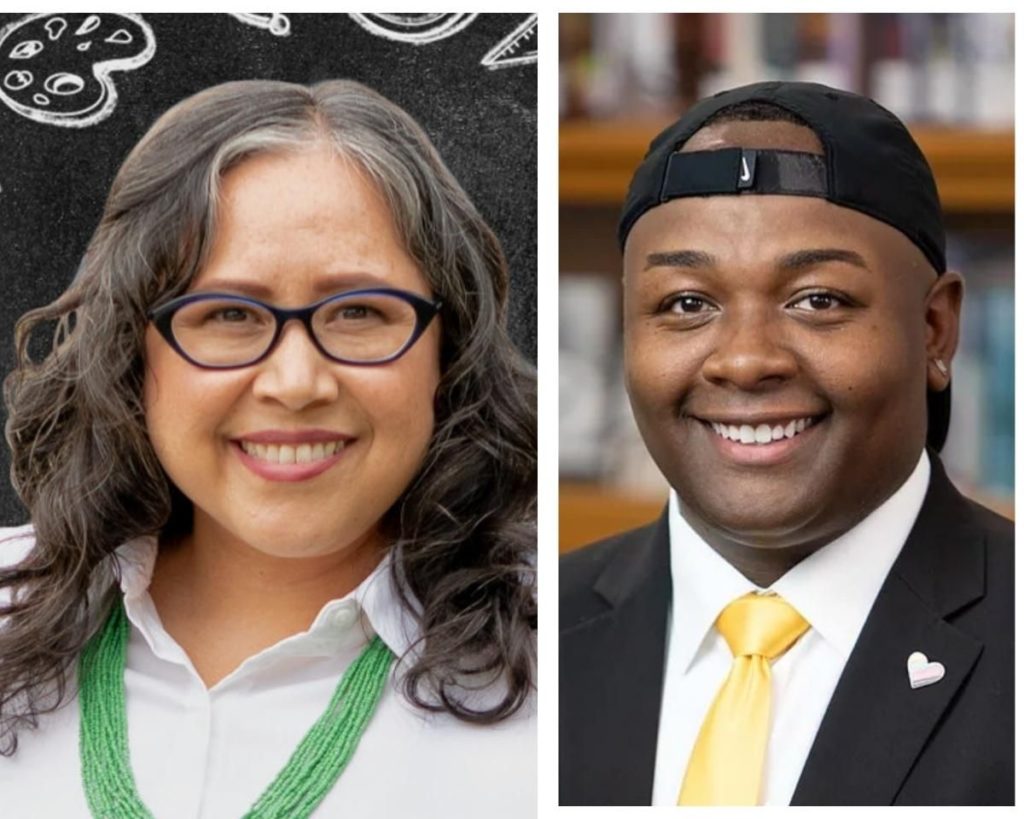Every time something happens that makes it appear as though the Denver school board might move past its paralyzing issues, something else stops the potential progress in its tracks.
On Monday, in a moment of post-Thanksgiving repentance, Vice President Auon’tai Anderson apologized to his colleagues and Superintendent Alex Marrero for his part in interpersonal dynamics that have hampered the board’s effectiveness. For a few hours, that seemed to calm the long-turbulent waters.
“I want to apologize to you madam president for our interpersonal relationship, sometimes rising to the level where it has been a public show or display at our board meetings, but also that has distracted our DPS community. I ran for the seat so that we can focus on kids,” Anderson said.
Board President Xóchitl “Sochi” Gaytán, the other main player in the ongoing drama, accepted Anderson’s apology and his offer to enter into a one-on-one “restorative conversation.” She said the board needs to “redirect our attention to policy.” Notably, though, she did not offer an apology of her own.
But late in the evening, a bizarre and somewhat cryptic debate took place among board members, and between board members and Denver Public Schools General Counsel Aaron Thompson, about whether the board could and should go into executive session to discuss a personnel matter apparently involving Marrero.
Thompson made it sound as though he thought some board members were trying to build a case against Marrero. This infuriated board members Scott Esserman and Michelle Quattlebaum, who said Thompson was “creating a narrative” that would get out into the public sphere and cause damage.
The purpose of the executive session, from what I’ve heard, would have been to chastise Marrero in private for comments he made to The Denver Post about the board’s vote not to close any under-enrolled schools at the end of this year. Marrero told the Post that “the school board was distracted and unprepared to make the hard decision to close schools.” That didn’t sit well with some board members.
In the end, the executive session didn’t happen, because board member Carrie Olson is recovering from Covid. Speaking by video feed from another room in the building, she said she lacked the stamina to spend another hour in private discussion after almost six hours of public meeting and comment.
Where this leaves the district, Marrero, and the board is a mystery for now. But Anderson’s apology faded in significance in the wake of this new development.
Below is a column I wrote earlier this week for The Denver Gazette. It was published today, but was completed before these new developments occurred. I still stand by what it says, though some of the particulars have changed.
Here’s the column, modestly edited:
It’s tempting right now to steal a line from Dave Wasserman of the Cook Political Report:” I’ve seen enough.” Wasserman, a nonpartisan political analyst, uses that line to call congressional races when results become conclusive.
Who could blame anyone a year after the current Denver school board took office for saying they’ve seen enough to have concluded the situation is hopeless with the current cast of characters in place?
There have been multiple instances of dysfunction, incompetence, and unseemly infighting. The board more often than not has proved unable to perform its core functions.
Combine this mess with the inept moves and general tone-deafness of Superintendent Alex Marrero and his team and what you’ve got is a school district in crisis, and with no sense of direction.
But hope springs eternal. So, rather than despairing, I’m going to suggest some ways out of the current morass.
One glimmer of hope is that we have a school board election coming up next November, in which three seats are up. Elections have a way of focusing incumbents’ attention. It gives them an opportunity to reflect upon, if not their shortcomings (that’s probably wishful thinking), at least their electoral vulnerabilities.
The public at large, as well as influential advocacy groups, need to make it crystal clear to the board that any incumbent who continues to feed the dysfunction without offering constructive solutions to the board and district’s issues will not be reelected.
They need to deliver those messages in stark terms beginning right now. Groups like the new EDUCATE Denver show promise, but they need to take off the kid gloves and not worry if they hurt some feelings and bruise some egos.
Next, individuals and groups on both sides of the Denver education ideological divide need to join forces to deliver a clear message to all board members, including those not up for reelection. It’s a simple message: This is unacceptable. You are embarrassing us. You are poorly serving our children. Get to work on what matters.
Surely there are enough shared interests that people passionate about public education can bridge their differences to deliver this message. It’s no exaggeration to say the future of the city hinges on its public education system improving, not spiraling into deep and permanent dysfunction.
Finally, Marrero needs to step forward and lead. This includes meeting one-on-one with his bosses, the seven board members, to tell them their behavior is making it all but impossible for him to get anything done.
Though it would be personally risky, he should tell them if their behavior, individually and collectively, does not improve, he is going to leave sooner rather than later, and that he will go public about his reasons for doing so.
Not all of the blame rests with the school board. Marrero and his team need to get their collective act together as well. The performance of district leadership over the past several months has been erratic and illogical.
The bizarre series of retreats by Marrero on near-term school closures made necessary by declining enrollment and resulting budget challenges has been an embarrassment in its own right. First, Marrero said 10 schools would need to close at the end of the year. Then he backpedaled to five, before springing on the board at the last minute a proposal to close just two.
That didn’t fly either. Board members were not going to vote to close schools when district leadership had failed to do any kind of meaningful community outreach. This leaves the district with no plan for addressing its budget challenges, and school communities on edge about what comes next.
The second bizarre reversal – DPS abruptly relinquishing trademark claims to a student-created racial justice podcast – is a case of the district eventually stumbling into doing the right thing by reversing one of its dumbest decisions in recent memory.
Why did DPS decide to go after four young women who developed Know Justice Know Peace, a podcast that gained national recognition? No one has supplied a coherent explanation. The announcement last week that the district was dropping its trademark pursuit was equally incoherent. Apparently, officials thought the students’ former principal – a highly respected community leader – was seeking to profit off their work. That was never the case.
Some board members were vocal in their support of the young women. Most remained silent, much to their discredit. District officials put the students through a lot of stress and heartache in pursuit of…what, exactly?
The pressure that ultimately forced DPS to drop the trademark case just might provide a blueprint for how the citizens of Denver could force the board and the district to change course. Withering criticism from a diverse collection of voices eventually proved too much for DPS to withstand.
People need to replicate the unrelenting pressure strategy across a host of issues. The board and the district aren’t going to fix themselves.
We’re going to have to show them the way. Or show them the door.




